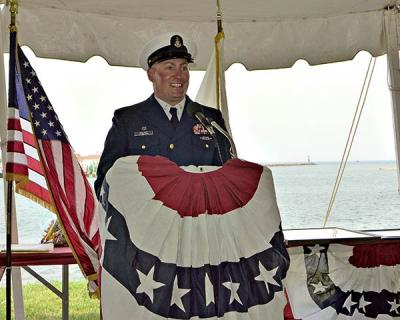Change of Command at Coast Guard Station Montauk

I attended the change of command ceremony held at the Coast Guard’s Station Montauk a week ago. Senior Chief Petty Officer Jason Walter handed the helm to incoming Senior Chief Petty Officer Eric Best. He then retired after 21 years of service to his country, and, by all accounts, extraordinary service to the Montauk and East Hampton communities during his last assignment.
The Montauk Chamber of Commerce had given him a grand sendoff the night before attended by Capt. Edward Cubanski, the Guard’s commander of the Long Island Sound sector. At the conclusion of his remarks the next day, Captain Cubanski recalled what Bonnie Brady of Montauk, executive director of the Long Island Commercial Fishing Association, and the wife of Capt. David Aripotch, had said during the chamber event that he had attended.
He said she’d told chamber members of a brief conversation she’d had with Chief Walter on the occasion of her husband’s fishing boat taking on water 50 miles from shore in terrible weather. Brady had repeated Chief Walter’s words to her: “Don’t worry, we’ve got you.” And, they did.
It was a solemn moment in a solemn ceremony with the people of the Montauk Station, and the cutter Ridley, standing at parade rest looking on along with members of Montauk’s commercial and recreational fishing communities. I have been fortunate enough to witness future Coast Guard officers and petty officers in training.
“You have to go out, but you don’t have to come back,” are among the very first words they hear from their instructors.
They were written into regulations of the United States Lifesaving Service, one of the Coast Guard’s precursor organizations, in 1899, based on the experience gained during the 109 previous years, from when the United States Revenue Service, the Guard’s founding agency, was created by an act of Congress in 1790.
The saying — in other words, “Do it right, your life depends on it” — is the underlying truth, the basic understanding that accounts for the way the Coast Guard goes about its business. Of course, it’s the way all mariners should go about their work or play, but they (we) don’t — not always — and even if we did, the sea is not a level playing ground. Nor do best laid plans always work out. People need to be rescued, and others “have to go out” because they have accepted it as their duty. Captain Cubanski brought it home.
He said (I’m paraphrasing here) that when one person is rescued, it’s not only one life, it affects the lives of his or her family back on shore and the community at large. He said it was Chief Walter’s leadership (his tight ship was recognized nationwide within the Coast Guard, Captain Cubanski said), as well as the strong ties he and his people had spliced into the existing bonds of Montauk’s greater fishing family that marked Chief Walter’s outstanding contribution.
It’s so easy to take such commitment for granted, but maybe that’s the whole idea. We who live, work, and play in one of the nation’s most fickle marine environments sense the presence of a safety net. We should never forget that the net is made of people, the ones we see now and then in uniform at the I.G.A. or the post office. It wouldn’t hurt to thank them for their service. Out here, it’s personal. And if you should meet up with Eric Best, the station’s new commander, tell him welcome aboard.
Fish don’t actually fear me. There, I’ve said it. There are more aggressive anglers, but I launched the sloop Leilani the other day and she is equipped with one boat rod for trolling up striped bass and bluefish, as well as when drifting for porgies, fluke, and sea bass (if and when that season opens on July 15). Hope so, because boaters have been catching some fat ones. And I have a casting rod should bass or bluefish venture too close when Leilani’s at anchor.
In the Montauk SurfMaster’s spring surfcasting tournament, Gary Krist moved into first place with a 42.1-pound striper he caught a week ago. The big bass pushed Arden Gardell’s 25-pounder into second place.
The tournament season has begun, of course. The first shark tournament of 2015 is scheduled for Friday and Saturday. Last year’s winner was the Reel Deal boat that landed a 377-pound thresher.
A reminder: It is now state law that only non-stainless-steel circle hooks be used when shark fishing in state waters. Circle hooks tend to lodge in the jaws of sharks rather than the gut. Non-stainless so that when a shark is released, the hook will eventually rust and fall away. I like the no-kill shark tournament approach better, but nobody asked me.
